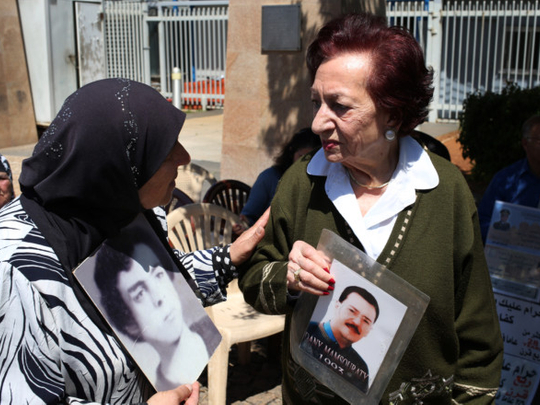
Beirut: For 22 years, Mary Mansourati has been waiting for her son, Dani, to come home. His shirts are ironed and hanging in his closet. His trousers, neatly folded, are stacked on the shelves next to his bed in the family’s Beirut apartment.
Dani was 30 when he was detained by Syrian intelligence and has not been heard from since. He is among an estimated 17,000 Lebanese still missing from Lebanon’s civil war or the years of Syrian domination that followed. The war in Syria has added new urgency to the plight of their families.
Hundreds of Lebanese were detained by the Syrians, and their relatives are convinced they are still alive. Now they fear they will be lost in Syria’s labyrinth of overcrowded jails and detention facilities or be killed in the ongoing mayhem.
The war in Syria has also added a new generation of names to the already long rolls of the missing. There are no exact figures, but human rights organisations say tens of thousands of Syrians have vanished in the three years since the uprising against President Bashar Al Assad began.
Elsewhere in the region, nearly 70,000 Iraqis are still missing from three wars over the past three decades, including sectarian bloodletting that was unleashed by the 2003 US-led invasion, according to government figures. There’s never been any truth or reconciliation process that might uncover the fates of these missing.
In both Lebanon and Iraq, few efforts have been made to examine what happened during the countries’ wars, mainly because many of those involved in killings and kidnappings have become politicians, some even serving in government.
The 82-year-old Mansourati believes her son is alive in a Syrian prison, despite having no concrete evidence or word that anyone has seen him. A fighter with an anti-Syrian Christian militia, he was arrested in 1992, two years after the civil war ended.
“We need our sons back,” she told The Associated Press in an interview at her home in east Beirut, where she cares for her gravely ill husband.
Friday marked the ninth anniversary of a permanent protest tent Mansourati and other families of the missing have erected in downtown Beirut. Every day, relatives sit at the tent, sometimes spending the night. Photos of the missing and slogans calling on Al Assad to explain their fate line the sides of the tent.
“We are tired of going back and forth to the tent. We are getting old,” Mansourati said.
Like many relatives of the missing, she believes Lebanese officials, some of whom led militias during the civil war and fought on behest of the Syrians, are complicit in covering up their loved ones’ fates.
Rights groups speak of a “conspiracy of silence,” with officials withholding information out of concern they could be implicated in wartime atrocities.
Most of the thousands missing likely are dead. They disappeared after being kidnapped by rival Lebanese militias during the war, which saw multiple sectarian massacres, and there’s little chance any Lebanese faction could keep someone secretly detained for nearly a quarter century. Still, even uncovering suspected locations of mass graves where the missing might be is considered too politically explosive.
When the families persisted in demanding the truth, the government said it couldn’t help because digging too deep into the past could inflame old hostilities and unleash another war.
“The official discourse was, if peace is to prevail we need to forget the past and move on into the future,” said Lebanese lawyer Nizar Saghieh, who has represented hundreds of families seeking to discover the fate of their missing relatives.
But the families of those who disappeared after being detained by Syria are far less convinced by the government’s death declaration. Rights groups estimate they number between 300 and 600 Lebanese.
Majida Hassan Bashasha’s brother, Ahmad, was picked up by Syrian troops at a checkpoint near Beirut in 1976, the year Syrian forces entered Lebanon to help quell the sectarian fighting. Ahmad was 18 when he vanished, and his sister says he was not a militant.
Like Mary Mansourati, 59-year-old Bashasha believes her brother is alive, languishing in a Syrian prison. She has been campaigning relentlessly to bring him home, attending annual rallies of the families of the disappeared in front of the local UN headquarters in Beirut. A few years ago, several former detainees came to the protest tent and recognised her brother from a picture she was holding. They said they shared a cell with him in a Damascus prison.
“I am his big sister and my heart tells me he is still alive,” Bashasha said, holding a black-and-white photo of a young man she said was Ahmad.
Initially, when the conflict started in Syria she feared that her brother and other Lebanese detainees would be forgotten. But now, as she watches Al Assad’s agents fill Syria’s prisons with a new generation of government opponents, she holds out some hope that any Lebanese being held in Syria will be released.
“They don’t need them in prison anymore,” Bashasha said.










